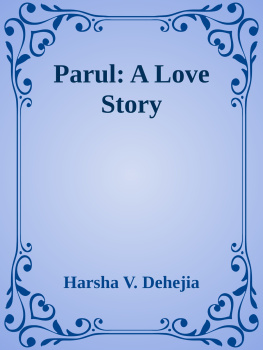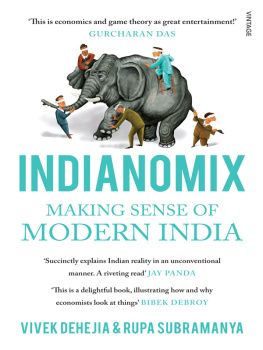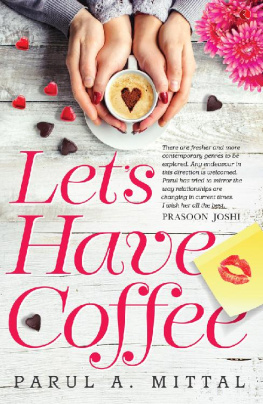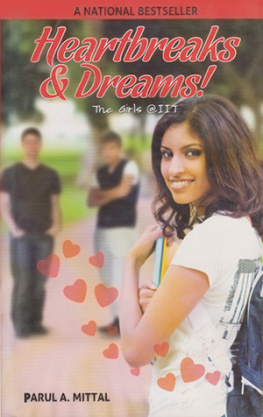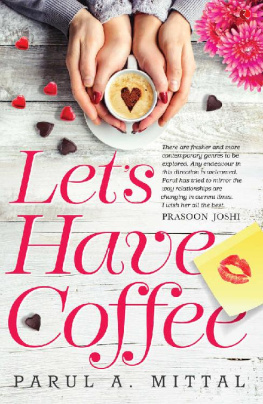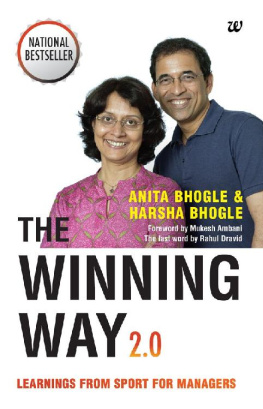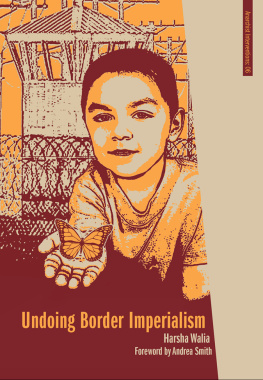Harsha V. Dehejia - Parul: A Love Story
Here you can read online Harsha V. Dehejia - Parul: A Love Story full text of the book (entire story) in english for free. Download pdf and epub, get meaning, cover and reviews about this ebook. year: 2013, genre: Non-fiction. Description of the work, (preface) as well as reviews are available. Best literature library LitArk.com created for fans of good reading and offers a wide selection of genres:
Romance novel
Science fiction
Adventure
Detective
Science
History
Home and family
Prose
Art
Politics
Computer
Non-fiction
Religion
Business
Children
Humor
Choose a favorite category and find really read worthwhile books. Enjoy immersion in the world of imagination, feel the emotions of the characters or learn something new for yourself, make an fascinating discovery.
- Book:Parul: A Love Story
- Author:
- Genre:
- Year:2013
- Rating:5 / 5
- Favourites:Add to favourites
- Your mark:
- 100
- 1
- 2
- 3
- 4
- 5
Parul: A Love Story: summary, description and annotation
We offer to read an annotation, description, summary or preface (depends on what the author of the book "Parul: A Love Story" wrote himself). If you haven't found the necessary information about the book — write in the comments, we will try to find it.
Parul: A Love Story — read online for free the complete book (whole text) full work
Below is the text of the book, divided by pages. System saving the place of the last page read, allows you to conveniently read the book "Parul: A Love Story" online for free, without having to search again every time where you left off. Put a bookmark, and you can go to the page where you finished reading at any time.
Font size:
Interval:
Bookmark:



OTHER LOTUS TITLES | |
Adi B. Hakim | With Cyclists Around the World |
Rustom B. Bhumgara | |
Jal P. Bapasola | |
Ajit Bhattacharjea | Sheikh Mohammad Abdullah: Tragic Hero of Kashmir |
Anil Dharker | Icons: Men & Women Who Shaped Todays India |
Aitzaz Ahsan | The Indus Saga: The Making of Pakistan |
Amarinder Singh | The Last Sunset: The Rise & Fall of the Lahore Durbar |
H.L.O. Garrett | The Trial of Bahadur Shah Zafar |
Hussain Zaidi | Dongri to Dubai: Six Decades of Mumbai Mafia |
Imtiaz Gul | Pakistan Before and After Osama |
Kiran Maitra | Marxism in India: From Decline to Debacle |
Kuldip Nayar | Beyond the Lines: An Autobiography |
M.J. Akbar | Byline |
M.J. Akbar | Blood Brothers: A Family Saga |
M.J. Akbar | Have Pen will Travel: Observations of a Globetrotter |
Maj. Gen. Ian Cardozo | Param Vir: Our Heroes in Battle |
Maj. Gen. Ian Cardozo | The Sinking of INS Khukri: What Happened in 1971 |
Madhu Trehan | Tehelka as Metaphor |
Masood Hyder | October Coup: A Memoir of the Struggle for Hyderabad |
Monisha Rajesh | Around India in 80 Trains |
Nayantara Sahgal (ed.) | Before Freedom: Nehrus Letters to His Sister |
Peter Church | Added Value: The Life Stories of Indian Business Leaders |
Preeti Monga | The Other Senses: An Inspiring True Story of A Visually Impaired Woman and Her Road to Success |
Rajika Bhandari | The Raj on the Move: Story of the Dak Bungalow |
Salman Akhtar | The Book of Emotions |
Shrabani Basu | Spy Princess: The Life of Noor Inayat Khan |
Vir Sanghvi | Men of Steel: Indian Business Leaders in Candid Conversations |
FORTHCOMING TITLES | |
Lucy Peck | Fatehpur Sikri |
Ranjit Lal | Bambi, Chops and Wag |

Lotus Collection
Text Harsha V. Dehejia, 2013
All Rights Reserved. No part of the publication may be reproduced or transmitted in any form or by any means, electronic or mechanical, including photocopying, recording, or by any information storage and retrieval system without the written permission and consent of the publisher.
Processed by Reproscan, Mumbai
Cover design: Bonita Vaz-Shimray
Frontispiece: Baramasa, Kangra, 1820-30
Dedicated to everyone who celebrate
the many meanings of shringara,
in poetry and painting
in dance and music
and who are able to move it seamlessly
from adornment to romance
from the arts to life and living.

I t was forty years ago that they had first met at a wedding. Praful was holding ten-month-old Prashant in his arms as he was struggling to eat from a plate on his knee. It was a large wedding and most of the guests had formed groups and seemed to be having fun; even Prafuls wife Mayuri had found a place to sit. Parul was dressed in a plain light blue saree; as she spotted Praful struggling with the infant, she offered to help.
Let me break the roti for you into small pieces.
That would be a great help. Even as Praful tried to feed Pranav and himself, their eyes met. Something stirred within him and his heart skipped a beat. However, the task of handling Pranav was enough to keep him totally occupied. soon the child fell asleep on his shoulder and he put him down on a chair. Just then, he heard the sound of music and saw people converging toward the centre of the room. He could see preparations for a garba rasa and the woman in the blue sari was right at the hub of this. she was extremely animated as she whirled around to the beat of the music, her face glowing. Praful watched her spellbound. The missed heart beat turned to heartache; before he could realize what he felt, he went to the circle of dancing men and women, and could not take his eyes off her. When the music stopped, he went up to her.
I did not catch your name, I am Praful.
And I am Parul. There was a certain music and romance in her voice.
There were a few beads of sweat on her brow and she was still gasping for breath as she adjusted the pallu of her sari, which was draped over her right shoulder.
You are the only one at this wedding function to have worn the sari in the Gujarati style.
Yes; I am a Gujarati and proud to be one. There was a certain rustic directness in the way she talked.
I am a Gujarati too but I have never lived in Gujarat.
But you speak such perfect Gujarati.
Yes, but you look like a perfect Gujarati.
Parul laughed. This was how she responded to compliments; Praful was drawn to her even more by the way she laughed and moved. He was struck by her simple charm and disarmingly earthy behavior. What was her driving force, he wondered. Who was she?
Do you do Bharatanatyam?
No. To me garba and rasa are my dances, of my people and my culture.
But Bharatanatyam is a form of classical art and so stylised and sculpturesque. It is the epitome of Indian classical aesthetic sensibility. All our sculptures are designed after classical dance postures.
That may be so. But the real India is in its folk art and crafts, in the people of the villages, for ours is a krishi sanskriti, an agricultural civilization where vasant and varsha are the defining periods. It is during that season that the world around us comes to life, the earth trembles and people are animated. Parul, in her naive but firm manner, was defending the folk tradition, while Praful, a suave, westernized Professor of Philosophy was holding out for the primacy of classical arts even while people in the party milled around them.
Parul was not one to take the hegemony of the classical arts lying down. she tucked her pallu and said, The Indian concept of beauty is different, but in no way inferior, in the folk as distinguished from the classical tradition. For the folk artist or craftsman, utility was the primary concern. Objects of daily use, like cooking utensils or betel nut boxes and crackers, toilet boxes, ink pots and even foot scrubbers, had to be beautifully made. These objects of everyday use were objects they lived with and it was important they were well made and lovingly used as it added a certain grace to their life. The mud walls of their homes and huts, the floors and ceilings, provided a further outlet for their creative urges. These they decorated with a variety of designs and motifs. Old clothes were not discarded but were made into quilts. The motifs of these simple folk artists were based on vegetative and animal themes, such as birds and animals, plants and creepers, the rain and clouds. But under the facade of these simple designs lay a life-affirming world-view uniquely their own. Fertility and growth was important to these rural people and they expressed it with motifs, such as two birds sitting together or flowers blooming from plants and trees. They expressed their simple philosophy even in their choice of colours, for red was their favourite colour. Through it, these artists showed their preoccupation with fertility. Adornment was another feature of folk art; they adorned everything with a flourish, whether it was their threshold or their own bodies. For them, the human body was the repository of beauty. While folk art was not meant for aesthetic contemplation, it was an expression and celebration of beauty and the reality of the world around them. And there was nothing unreal about it. Parul could be professorial when she wanted to be, particularly when it came to the importance and beauty of folk art and craft. she was not going to be cowed down by a learned professor, who was setting up a hierarchy between the folk and the classical arts and talking about the unreality of this world of hers. There was in her an innate wisdom, a self-taught aesthetics of the ordinary and everyday life around her, a desire to stand firm on the earth but yet reach out to the sky in her own simple, unpretentious way. What she lacked in the sophistication and intellectuality of words she more than made up for with her infectious smile, her evocative gestures, her earthy and rustic clothes and adornments and warm and loving voice.
Font size:
Interval:
Bookmark:
Similar books «Parul: A Love Story»
Look at similar books to Parul: A Love Story. We have selected literature similar in name and meaning in the hope of providing readers with more options to find new, interesting, not yet read works.
Discussion, reviews of the book Parul: A Love Story and just readers' own opinions. Leave your comments, write what you think about the work, its meaning or the main characters. Specify what exactly you liked and what you didn't like, and why you think so.

